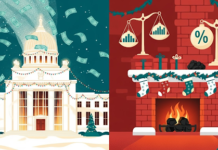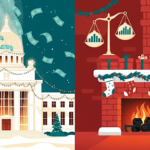Welcome to this week’s edition of The Market Pulse, your trusted source for dissecting the latest market trends and economic shifts. This week, we delve into the implications of a potential Trump 2.0 presidency and its expected impact on the investment landscape.
The political horizon is once again abuzz with speculation, as the likelihood of Donald Trump’s return to the Oval Office increases. A Trump presidency promises significant shifts in trade policies, particularly with China, which could usher in a new era of tariffs and economic adjustments. But what does this mean for your investments? And how can you stay ahead of the curve?
Today, we’ll explore the nuanced impacts of these potential changes. From inflation and interest rates to stock market predictions, our main article breaks down the critical elements investors need to watch. In our “This Week I Learned” section, we’ll reveal some surprising insights about tariff policies and their broader economic repercussions. And of course, our “Fun Corner” is back with a humorous yet insightful look at the quirks of market reactions.
Stay tuned as we unpack these topics and more, offering you the tools and knowledge to navigate these uncertain times with confidence.
This Week I Learned…
Understanding Tariffs and Their Economic Impact
This week I learned about the intricate dance of tariffs and their ripple effects on the global economy. When President Trump floated the idea of imposing a 60% tariff on Chinese goods, it sent shockwaves through markets. Tariffs, essentially taxes on imports, can significantly influence inflation and interest rates.
Higher tariffs mean higher costs for imported goods, which can drive up consumer prices and inflation. This, in turn, puts pressure on the Federal Reserve to adjust interest rates, potentially leading to rate hikes. Such measures could stymie economic growth, affecting everything from corporate profits to GDP.
Moreover, the proposed tariffs would likely result in a stronger US dollar as a safe-haven asset, making US exports more expensive and less competitive globally. Understanding these dynamics helps investors anticipate market shifts and adjust their strategies accordingly.
The Fun Corner
Bull Markets and Bear Hugs
Did you hear about the Wall Street trader who decided to become a zookeeper? He figured it would be easier to handle actual bulls and bears than their market counterparts!
Speaking of animal-themed market wisdom, here’s a tidbit that might make you chuckle: The terms “bull” and “bear” market reportedly originated from the way these animals attack. Bulls thrust their horns upward, while bears swipe downward with their paws.
Interestingly, in the past week, we’ve seen the market behaving a bit like a confused chameleon, unsure whether to don bull horns or bear claws. With Trump’s tariff talks causing economic experts to butt heads faster than mountain goats in mating season, investors have been left scratching their heads.
But here’s a fun fact to lighten the mood: The New York Stock Exchange has a backup generator that can keep trading going for a week without external power. Talk about being prepared! It seems Wall Street took the Boy Scout motto to heart, ensuring that even if the lights go out, the trading never stops. Now that’s what we call a true market illuminati!
Trump’s Trade Winds – What a Trump 2.0 Presidency Means for the Markets
As Donald Trump’s chances of re-election rise, so do the questions about his potential economic policies. A hallmark of his previous tenure was the trade war with China, characterized by significant tariffs that reshaped global trade dynamics.
Trump’s proposal to impose a universal 60% tariff on Chinese imports could have profound implications. According to Capital Economics, such a move would likely reignite inflationary pressures, pushing up Treasury yields and leading to higher interest rates. This scenario could dampen stock market performance, especially if inflation outpaces economic growth.
Goldman Sachs analysts have noted that these tariffs would disproportionately hurt lower-income Americans, who spend a larger portion of their income on goods. The resulting inflation would erode purchasing power, leading to decreased consumer spending and slower GDP growth. In contrast, the wealthiest 1% might benefit from related tax cuts, widening the economic divide.
Despite these potential headwinds, the ongoing AI hype could provide a silver lining. Some analysts predict that the enthusiasm around AI advancements might create a stock market bubble, partially offsetting the negative impacts of a trade war.
In summary, while a Trump 2.0 presidency could introduce significant challenges, savvy investors can navigate these turbulent waters by staying informed and adaptable.
The Last Say
Dealing With Uncertainty in a Potential Trump Administration
As we wrap up this week’s edition of The Market Pulse, the debate over Trump’s fiscal policies underscores a broader theme of uncertainty in the markets. The possibility of significant tariff increases and a drastic overhaul of the income tax system presents both risks and opportunities for investors.
Key Takeaways:
- Be Cautious with Tariffs: While tariffs aim to protect domestic industries, they often lead to higher consumer prices and potential trade conflicts. Investors should monitor these developments closely and consider their impact on inflation and supply chains.
- Legislative Influence: The role of Congress will be crucial in shaping the extent of these policies. Investors should pay attention to political dynamics and potential compromises that could moderate the proposed measures.
- Historical Lessons: Looking back at past tariff implementations, such as the Smoot-Hawley Act, can provide valuable insights into potential outcomes and market reactions.
As we navigate these uncertain waters, staying informed and adaptable is key. Whether you’re optimistic about Trump’s policies or share the concerns of his critics, understanding the potential impacts and preparing for various scenarios will help you make smarter investment decisions.
Until next week, stay sharp and stay invested.

























